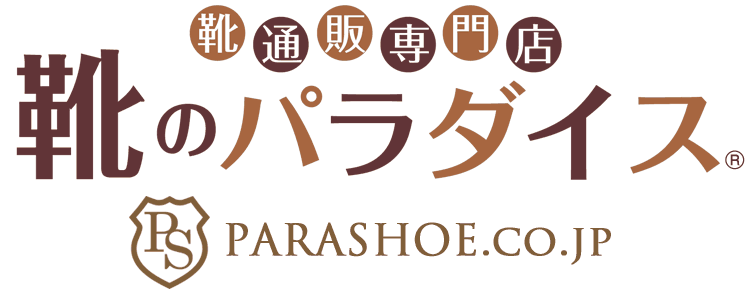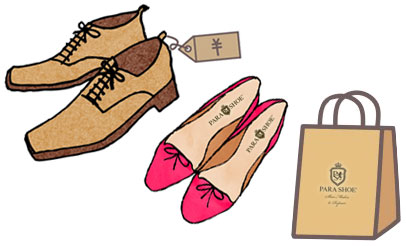
We will explain the English translations of Japanese words and conversation used when shopping at Japanese shoe stores.
Please use this information when buying shoes in Japan.
(日本の靴屋で買い物をするときに使われる、日本語の単語と会話の英語訳を説明します。日本で靴を買う際に、ぜひお役立てください。)
▼ basic words/基本単語
▼ Welcome (into a store) /いらっしゃいませ(来店する)
▼ Conversation with the store clerk/店員さんとの会話
▼ Try on shoes/試し履き(試着)する
▼ Check price/値段を確認する
▼ Payment/支払う
・Receive change/おつりを受け取る
▼ Receive/受け取る
▼ Finish shopping/お買い物終了
▼ 『Anatomy of Shoes』Names of parts of shoe/靴の部位の名称
▼ Polite language,Honorific language, humble language/丁寧語、敬語、謙譲語
▼ Extra edition (Japanese slang)/番外編(日本語スラング)
▼ Related pages(関連ページ)
(explanation:Nobuyuki Oshima/説明文:靴のパラダイス店長 大嶋信之)
basic words/基本単語
First, let’s introduce some basic words.(まず、基本的な単語を紹介します。)
English(英語)=Japanese(日本語)
・shoes=靴(くつ/kutsu)、シューズ(shoes/shuuzu)
・leather shoes=革靴(かわぐつ/kawa-gutsu)、レザーシューズ(leather shoes/lezah-syuuzu)
・sneakers=スニーカー(sneaker/suniikar)
・loafers=ローファー(loafer/lohfar)
・pumps=パンプス(pumps/panpsu)
・sandals=サンダル(sandal/sandalu)
・boots=ブーツ(boots/buutsu)
・men’s shoes=紳士靴(しんしぐつ/shinshi-gutsu)、メンズシューズ(men’s shoes/menzu-syuuzu)
・woman’s shoes=婦人靴(ふじんぐつ/fujin-gutsu)、レディースシューズ(ladies shoes/lediisu-syuuzu)
・shoehorn=靴べら(くつべら/kutsu-bera)、シューホーン(shoehorn/syuuhoon)
・stock=在庫(ざいこ/zaiko)
・size=サイズ(size/saizu)
・width=ワイズ(width/waizu)
・cm=センチ(centi/senchi)
Welcome(Enter the store) /いらっしゃいませ(入店する)

When you enter the store, the clerk will say, 「irasshaimase(Japanaese”Welcome”).
(お店に入ると、店員さんが「いらっしゃいませ」と言ってきます)
Usually, you don’t need to react at all. It’s okay to give a slight nod.
(通常は、何も反応しなくてもよいです。軽い会釈をしてもいいです。)
「irasshaimase(いらっしゃいませ)」is a unique commercial Japanese word that means “welcome to our store” .
(「いらっしゃいませ」は、独特の商用日本語で「お店へようこそ」を意味します。)
Conversation with the store clerk/店員さんとの会話

After looking at the products for a while, a store employee will talk to you.
Usually, they say, 「yoroshikereba, size wo omochishimasu node,omoushitsuke-kudasai./よろしければ、(あなたの)サイズをお持ちしますので、お申し付けください/If you don’t mind, I’ll bring your size to you, so let me know.」.
I think it corresponds to “May I help you?” at a regular store(other than a shoe store).
(しばらく商品を見ていると、店員さんが話しかけてきます。
通常は、「よろしければ、(あなたの)サイズをお持ちしますので、お申し付けください」と言ってきます。)
このかけ声(フレーズ)は、通常のお店(靴屋以外)の「May I help you?」に該当するかと思います。
「yoroshikereba, size wo omochishimasu node,omoushitsuke-kudasai.」
(よろしければ、サイズ を お持ちします ので、お申し付け-ください)
・「yoroshikereba(よろしければ)」means “If you don’t mind” or “If you like”
・「omochishimasu(お持ちします)」=I’ll bring it to you
・「node(ので)」=so
・「momoushitsuke(お申し付け)」=tell us
・「kudasai(ください)」=Please
返答例
No thanks(結構です)
「kekkou-desu」
・kekkou=I do not need it
・desu=polite phrases
Now I’m just looking(今は、ただ見ているだけです)
「ima ha(wa),miteru dake desu」
・ima=now
・ha(wa)=is,at
・miteru=looking,watching
・dake=only
・desu=polite phrases
I want you to bring 26.0cm and 26.5cm.(26センチと26.5センチを持ってきて来てほしい)
「ni-jyuu-roku-centi to ni-jyuu-roku ten go-centi wo mottekite-hoshii」
Try on shoes/試し履き(試着)する
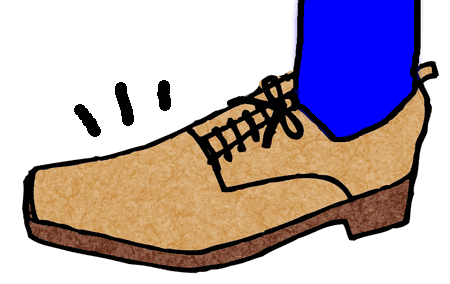
Try on shoes to check size.
If the size is too tight, tell the store clerk, 「kitsui(きつい)/tight」.
If the size is too loose, tell the store clerk, 「yurui(ゆるい)/loose」.
Ask the store clerk to bring you another size.
(靴を試着して、サイズを確かめます。サイズがきつい場合は、「きつい」と店員に伝えます。サイズがゆるい場合は、「ゆるい」と店員に伝えます。店員に他のサイズを持ってきてもらいましょう。)
■Example of what a store clerk says(店員の声かけ例)
How about the size?=「size ha(wa) ikaga-desu-ka?」(さいずは、いかがですか?)
・ha(wa)=is
・ikaga=how
・desu=polite phrases
・ka=question form
It suits you very well=「totemo oniai-desu」(とても お似合い です)
・totemo=very
・oniai=suits well
・desu=polite phrases
■Example response(返答例)
・liked it=ki ni irimasita(気に入りました)
・I don’t like it=ki ni irimasen(気に入りません)
・I’ll take it=kore,kaimasu(これ、買います)
・I don’t need it this time=konkai wa yameteokimasu(今回は要りません)
・I’ll stop buying it=kau no wo yamemasu(買うのをやめます)
■Words about shoe size(靴のサイズ感の言い回し)
・just size=pittari(ぴったり)、choudo-yoi(ちょうど良い)
・tight=kitsui(きつい)、taito(タイト)
・loose=yurui(ゆるい)
・very loose=bukabuka(ぶかぶか)
Example:
The size is good, but the width is tight.=「size(saizu) ha(wa) yoi desu ga, haba ga kitsui desu」(サイズは良いですが、幅がきついです)
・size(saizu)=size
・ha(wa)=is
・yoi=good
・desu=polite phrases
・ga=but
・haba=width
・ga=is
・kitsui=tight
・desu=polite phrases
■Availability of stock(在庫の有無)
・stock=zaiko(在庫)
・In stock=zaiko-ari(在庫あり)
・Out of stock=zaiko-nashi(在庫なし)、zaiko-kire(在庫切れ)
■Others/その他
・shoehorn=kutsu-bera(靴べら)
・chair=isu(椅子/いす)
Check price/値段を確認する
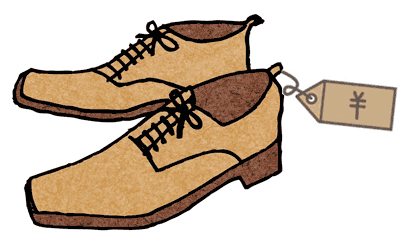
Check the price of the product.
If you don’t know the price, ask the store clerk,「kore-wa,ikura-desuka?(これは、いくらですか?)/How much is this?」.
(商品の値段を確認します。もし値段がわからないときは、「これは、いくらですか?」と店員に尋ねます。)
「kore ha(wa),ikura desu+ka?」(これ-は、いくら-です+か?)
・kore=this
・ha(wa)=is
・ikura=how much
・desu=polite phrases
・ka?=question form
Check whether it 「zei-komi(税込み)/includes tax」or「zei-nuki(税抜き)/excludes tax」.
(「税込み価格」か「税抜き価格」かも確認しておきましょう)
・zei=tax
・komi=includes
・nuki=excludes
Payment/支払う
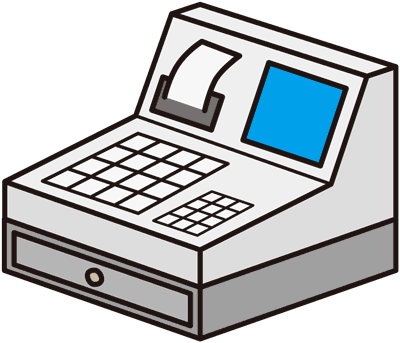
Once you have decided on the items you want to purchase, pay the bill.
Tell the clerk your preferred payment method, such as cash or credit card.
(買う商品が決まったら、お会計をします。現金か、クレジットカードなど、希望の支払い方法を店員に伝えます。)
■Example of staff shouting(店員のかけ声例)
Is it okay to pay in cash?=「o-shiharai ha(wa) genkin de yoroshii desyou-ka?」(お支払いは、現金 で よろしい でしょうか?)
・o=polite phrases
・shiharai =Payment method
・ha(wa)=is
・genkin=cash
・de=in,by
・yoroshii=okay
・desyou(desu)=polite phrases
・ka?=question form
Is it okay to pay by credit card as a lump-sum payment(one-time payment)?=「credit card no oshiharai ha(wa) ikkatsu-barai de yoroshii-deshou-ka?」(クレジットカード の お支払い方法 は 一括払い で よろしい でしょうか?)
・creditcard(kurejitto-caado)=credit card
・no=is
・o=polite phrases
・shiharai =Payment method
・ha(wa)=is
・ikkatsu=one-time
・barai(harai)=pay
・ikkatsu-barai=Lump-sum payment
・de=in,by
・yoroshii=okay
・desyou(desu)=polite phrases
・ka?=question form
■Example response(返答例)
I’ll pay cash=「genkin de shiharai-masu」(現金 で 支払い ます)
・genkin=cash
・de=in,by
・shiharai(shiharau)=pay
・masu=polite phrases
I’ll pay by credit card=「creditcard de shiharai-masu」(クレジットカード で 支払い ます)
・creditcard(kurejitto-caado)=credit card
・de=in,by
・shiharai(shiharau)=pay
・masu=polite phrases
Pay in one lump sum with credit card=「creditcard no ikkatsu-barai de shiharai-masu」(クレジットカード の 一括括払い で 支払い ます)
・creditcard(kurejitto-caado)=credit card
・no=of
・ikkatsu=one-time
・barai(harai)=pay
・ikkatsu-barai=Lump-sum payment
・de=in,by
・shiharai(shiharau)=pay
・masu=polite phrases
●credit card installment payment(クレジットカードの分割払い)
・Lump-sum pay,pay in full=ikkatu-barai(一括払い)、ikkai-barai(一回払い)
・pay in two installments=ni-kai-barai(2回の分割払い)
・pay in three installments=san-kai-barai(3回の分割払い)
ni=2,two
san=3,three
kai=time
barai(harai)=pay
ikkatsu,ikkai=one time
(ichi=1,one/ichi-kai=ikkai=one time)
Receive change/おつりを受け取る

If you pay change, a receipt, or a credit card, a receipt will be issued and you will receive it.
(お釣り、レシート・領収書、クレジットカードの場合はご利用控えが発行されますので、受け取ります。)
■Example of staff shouting(店員のかけ声例)
Since you paid 10,000 yen, you will have 1,500 yen in change.=「10,000(ichi-mann)-yen(en) oazukri simasita(oshiharai itadaki-mashita)-node 2,500(ni-sen-gohyaku)yen(en) no okaesi(otsuri) de gozaimasu」(10000 円 お預かり しました ので、1500 円 の お返し で ござい ます。)
・ichi=1,one
・mann=10000,ten thousand
・yen(en)=yen
・o=polite phrases
・azukari(shiharai)=payment
・shimasita=did
・itadaki-masita=I received it
・node=so
・ni=2,two
・sen=1000,thousand
・ni-sen=2000,two-thousand
・go=5,five
・hyaku=100,hundred
・go-hyaku=500,five-hundred
・no=of
・(o)kaeshi=return
・otsuri=change
・de=in
・gozaimasu=there is
This is a copy of your credit card, please check it.=「creditcard(kurejitto-card) no ohikae desu,otashikame kudasai」(クレジットカード の お控え です、お確かめ ください)
・creditcard(kurejitto-card) =credit card
・no=of
・o=polite phrases
・hikae=copy of your credit card
・(o)tashikame=check,confirm
・kudasai=please
■Example response(返答例)
It seems like I don’t have enough change by 200 yen.=「otsuri ga 200(ni-hyaku) yen(en) tarinai you-desu」(お釣りが 200円 足りないようです)
・otsuri=change
・ga=is
・ni=2,two
・hyaku=100,hundred
・ni-hyaku=200,two-hundred
・tarinai=not enough,shortage
・you=It seems like
・desu=polite phrases
Credit card payment amount is incorrect=「creditcard(kurejitto-card) no shiharai kingaku ga machigatte imasu」(クレジットカード の 支払い金額 が 間違って います)
・creditcard(kurejitto-card)=credit card
・no=of
・shiharai=payment
・kingaku=amount
・ga=is
・machigatte=incorrect
・imasu(masu)=polite phrases
Receive the product/商品(お品物)を受け取る

Once you have paid and the store staff has placed your item in a bag, they may offer to take it to the exit of the store instead of handing it over to you about「omise no deguchi made omochi-shimasu(お店の出口まで商品をお持ちします)/I’ll take it to the exit of the store.」
(お会計が済み、店員さんが商品を袋に入れてくれると、そのまま渡さないで「お店の出口までお持ちします」と申し出る場合があります。)
「omise no deguchi made omochi-shimasu」(お店 の 出口 まで お持ち-します)
・omise=store,shop
・no=of
・deguchi=exit
・made=to
・omochi=take,carry
・shimasu=do
Either say, 「ie, daijyoubu-desu(いえ、大丈夫です)/No, it’s okay」 and take it, or say, 「arigatou(ありがとう)/thank you」and take it at the exit.
(「いえ、大丈夫です」と言って受け取るか、「ありがとう」と言って出口で受け取るようにします。)
「ie, daijyoubu-desu」(いえ、大丈夫-です)
・ie=no
・daijyoubu=it’s okay
・desu=polite phrases
In Japan, there is a business custom in which a product before a customer has decided to purchase it is called a 「商品(syouhin)/product」, and a product the customer has decided to purchase is called a「お品物(おしなもの/oshinamono)/item,goods」.
(日本では、購入の決まる前の商品を「商品」、お客様が購入を決めた商品を「お品物」を呼ぶ商習慣があります。)
Finish shopping/お買い物終了

When you receive the item, the clerk will say,「arigatou-gozaimashita(ありがとうございました)/Thank you very much」and「mata okoshi-kudasai-mase(また お越しくださいませ)/Please come again」.If possible, respond with a slight nod.
(商品を受け取ると店員さんは「ありがとうございました」とか「またどうぞお越しください」と声をかけてくれます。できれば、軽い会釈程度で応えるといいでしょう。)
「arigatou-gozaimashita」(ありがとうございました。)
・arigatou=thank you
・gozaimashita=very much
「mata okoshi-kudasai-mase」(また お越しくださいませ)
・mata=again
・okoshi=come
・kudasai=please
・mase=polite phrases
『Anatomy of shoes』Names of parts of shoe/靴の部位の名称
Introducing the Japanese names of the parts of shoes.
(靴の部位の名称の日本語をご紹介します。)
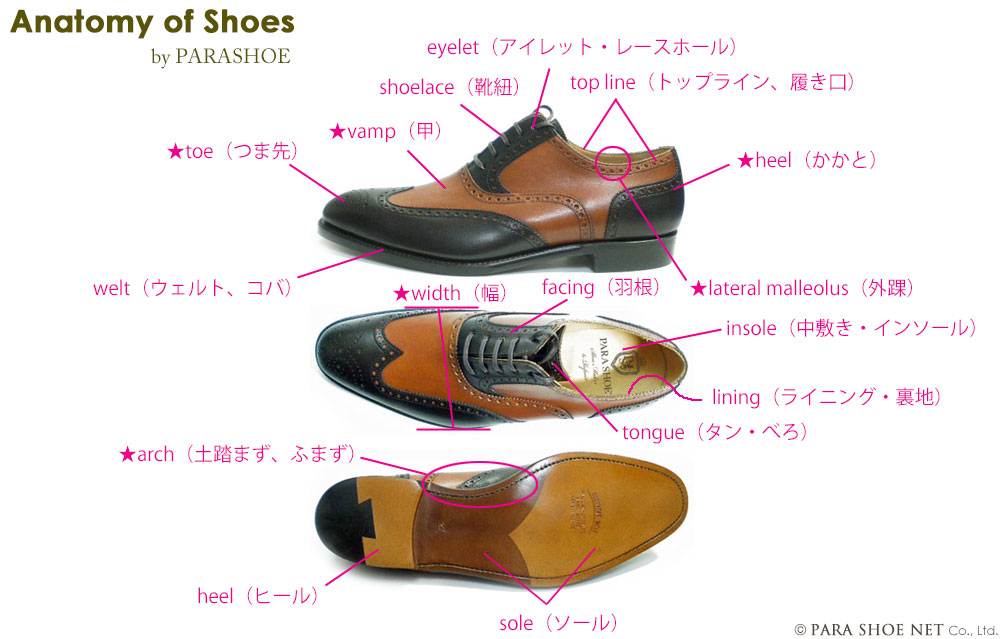
★Size matching at a shoe store(店頭でのサイズ合わせ項目)
・heel(ヒール hiilu)=★Does it match?(合っているか?)
・toe(つま先 tsumasaki/トゥ tou)=★Isn’t it tight?(キツくないか?)
・width(幅 haba/ワイズ waizu)=★Is it just right?(ちょうど良いか?)
・vamp(甲 kou)=★Is it just right?(ちょうど良いか?)
・atch(土踏まず tsuchifumazu/ふまず fumazu/アーチ archi)=★Does it match?(合っているか?)
・external ankle(外踝 soto-kurubushi/くるぶし kurubushi)=★Doesn’t it hit?(当たらないか?)
・eylet(アイレット ailetto/レースホール lacehole, leesu-hohlu)
・shoelace(靴紐 kutsu-himo/シューレース shoelace, syuu-leesu)
・facing(羽根 hane)
・tongue(タン tan/べろ bero)
・top line(トップライン topline, toppuline/履き口 haki-kuchi)
・lining(ライニング lining/裏地 uraji)
・insole(中敷き naka-jiki/インソール insole)
・welt(ウェルト welt/コバ koba)
・heel(ヒール heel)
・sole(ソール sole, sohlu)
Polite language,Honorific language, Humble language/丁寧語、敬語、謙譲語
We will introduce polite language, honorific language, and humble language that are often used when serving customers in Japan.
(日本の接客によく使われる丁寧語、敬語、謙譲語をご紹介します。)
o、go(お、ご、御)
“o and go” is added to the beginning of various Japanese nouns and verbs to make them more polite.
However, it is difficult because it cannot be attached to any noun or verb.
■OK example
・o-haki(お履き)=wearing shoes
・o-teire(お手入れ)=care
・o-migaki(お磨き)=polishing
・o-toilet(おトイレ)=toilet,restroom,bathroom
・o-denwa(お電話)=telephone
・go-raiten(ご来店・御来店)=visit us,visit our store,come in my store
・go-renraku(ご連絡・御連絡)=to contact
■NG example:
・o-kutsu(お靴)=NG→kutsu(靴)=shoes
itashimasu(いたします)・saseteitadakimasu(させていただきます)
itashi-masu(いたします/致します)
“itashi-masu(いたし ます)” is a humble form of “to do”.
「itashi(いたし)」means「itassu(いたす)」and means「do」in English.
It is a more polite expression with the addition of an「masu(ます)」.
sasete-itadaki-masu(させていただきます/させて頂きます)
“sasete-itadaki-masu(させて いただき ます)” is a humble expression of “I’ll let you do it.”
「sasete(させて)」 is a humble form of「suru(する)/do」 .「itadakki,itadaku(いただき、いただく)」 is a humble form of「morau(させて)もらう/I’ll let you(do)」.
It is a more polite expression with the addition of an「masu(ます)」.
example:
・We will check the stock
zaiko wo kakunin itashi-masu(在庫を確認いたします)
zaiko wo kakunin sasete-itadaki-masu(在庫を確認させていただきます)
zaiko=stock
wo=is
kakunin=check,confirm
itashimasu=do
saseteitadakimasu=do,I will let you do
yoroshikereba(よろしければ)・moshi-yoroshikereba(もし、よろしければ)
「yoroshikereba(よろしければ)」means「If you like」in English.
「moshi-yoroshikereba(もしよろしければ)」means「If you do not mind, If you’d like」in English.
Both phrases are often used in customer service.
example:
・If you’d like, we’ll check the stock.
(moshi)yoroshikereba, zaiko wo kakunin itashi-masu((もし)よろしければ、在庫を確認いたします)
moshikereba=If you’d like
zaiko=stock
wo=is
kakunin=check,confirm
itashimasu=do,I will do
doumo(どうも)、doumo-doumo(どうも どうも)
=Hi, Hallo / very much
It also has the meaning of a greeting,it can be added to many different words.
doumo-dumo is often used as a greeting.
example:
doumo itsumo osewa ni nattei-imasu(どうも、いつも お世話になっています)=Thank you very much for your help every time.
doumo arigatou(どうも ありがとう)=Thank you very much
doumo doumo(どうも どうも)=Hello
suimasen(すいません)
=Excuse me、sorry
In Japan, it is often used to humble oneself, rather than to apologize.
example:
suimasen, pen wo totte kudasai(すいません、ペン を 取って ください)=Excuse me, please take the pen.
doumo suimasen(どうも すいません)=I’m sorry
ee(えー)、eeto(えーと)
=well、Erm、Hmm、Umm
It’s a filler word
o-tesuki(おてすき)
=when you have time, When you have free time
example:
otesuki no toki ni o-denwa kudasai(お手すき の 時 に、お電話 ください)=Please call me when you have time
shikarubeki(しかるべき)
=appropriate
example:
shikarubeki busyo de taiou sasete-itadakimasu(しかるべき 部署 で、対応 させて頂きます。)=The appropriate department will address your issue.
otesuu-desuga(おてすうですが/お手数ですが)
=Sorry for taking your time, I’m sorry for taking up your effort.
example:
otesuudesuga, o-namae wo go-kinyuu kudasai(お手数ですが、お名前 を ご記入 ください)=We apologize for the inconvenience, but please write your name
go-sokurou okake shimasu(ご足労 おかけ します)
=We apologize for the inconvenience.
example:
gosokurou okakeshimasu ga mata go-raiten kudasai(ご足労 おかけします が、また ご来店 ください)=We apologize for the inconvenience, but please visit us again.
o-sewa ni narimasu(お世話になります)
=Thank you for your help, Thank you for the transaction
yoroshiku onegai itashimasu(よろしく お願い いたします)
=Thank you for your support, best regards
noun(meishi/名詞)
go-shisoku(ごしそく・ご子息・御子息)=son,your son
A word used to show respect for someone else’s son
This is a more polite word by adding「go(ご・御)」to「shisoku(子息)」.
example:
goshisoku no kutsu no size(saizu) ha(wa), nan-senchi desu ka?(ご子息の靴のサイズは、何センチですか?)=What size(cm) is your son’s shoes?
pronoun(daimeishi/代名詞)
shousei(しょうせい・小生)=I
A word used by a man to humble himself
example:
syousei ha(wa) kutsu ga suki desu(小生 は 靴 が 好き です)=I like shoes
sore ha(wa), syousei no kutsu desu(それは、小生 の 靴 です)=This is my shoes
temaedomo(てまえども・手前ども)=we、our store
This is a humble way of saying “we、our store.”
example:
temaedomo niha(niwa) goyoui gozaimasenn(手前ども には ご用意 ございません)=we don’t have it、Our store doesn’t have it.
Extra edition (Japanese slang)/番外編(日本語スラング)
In Japan, there are actually a lot of Japanese words that are also called「wakamono-kotoba(若者 言葉/youth language)」that are not included in textbooks.
Please see the page below for more information.They are very useful to remember.
(日本では、実際には、「若者言葉」とも呼ばれる、教科書などには載っていない、日本語も多く使われています。以下のページで、詳しくご紹介してますので、よろしければご覧ください。覚えておくと、何かと便利です。)
phrase example(フレーズ例)
・kono kutsu mecha-mecha kakkoii(この 靴 めちゃめちゃ カッコイイ)=These shoes are so cool
・ano kutsu ha(wa) oni takai(あの 靴 は 鬼高い)=those shoes are very expensive
・omae no kutsu ha(wa) sugoku iketeru(お前 の 靴 は すごく イケてる)=your shoes is so cool
Related pages(関連ページ)
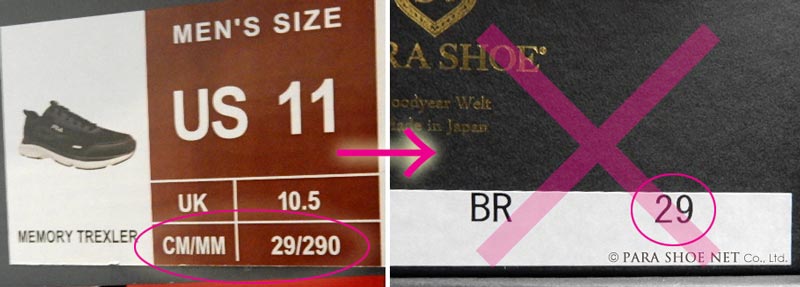
The size of Japanese leathershoes and the size of nationalbrand sneakers are different.
日本の革靴サイズ(JIS)とナショナルブランドのスニーカーサイズの違いについて。(英文)
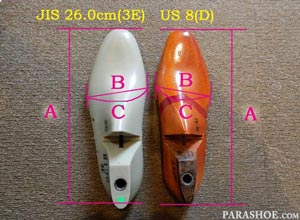
米国(アメリカ)の木型(シューラスト)と日本の木型のサイズを比較する
アメリカ(米国)のUSサイズ(インチ)の木型と、日本のJIS規格に基づくセンチ(cm)サイズの木型を比較し、サイズやワイズの差などを考察していきます。
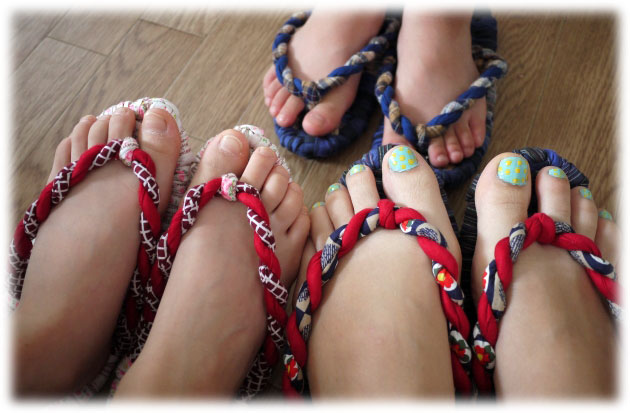
日本の靴(履物)の歴史を知ろう-History of Japanese shoes(Japan’s Traditional Footwear)
日本の履物の歴史。草鞋(わらじ)、雪駄(せった)、下駄(げた)、足袋(たび)など、西洋靴が広まる以前の日本人の足元(靴)について。
History of Japanese footwear. About the footwear of Japanese people before Western shoes became widespread, such as 草鞋(straw sandals), 雪駄(setta), 下駄(geta), and 足袋(tabi).
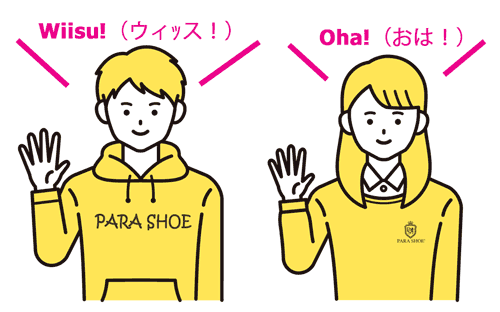
Japanese slang/日本語スラング
We will introduce Japanese words that are not official and are not often found in teaching materials or textbooks.
(正式ではなく、なかなか教材や教科書に載っていない日本語をご紹介します。)
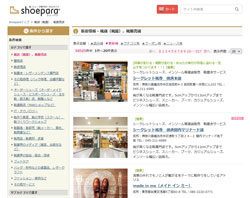
日本全国の靴店検索(Japanese shoe store search)
全国の靴店(シューズショップ)検索サイト。
Shoe store search site throughout Japan.
